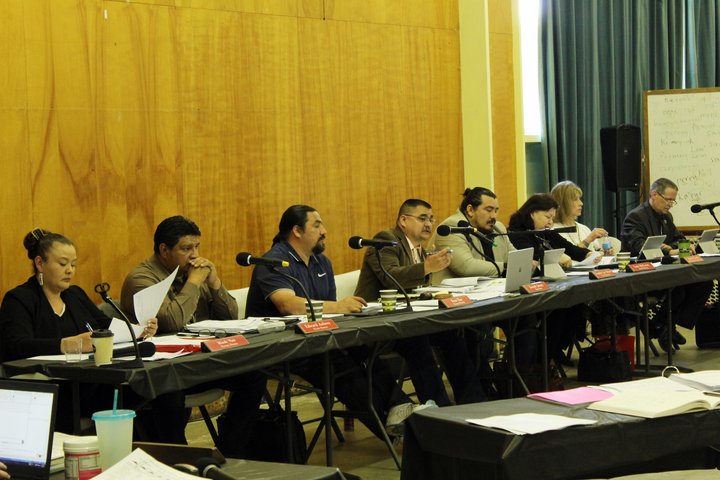
Photo of Tribal Council courtesy Yurok Tribe.
The Yurok Tribe today became the first jurisdiction in the county to signal that it’s ready to move forward with extensive hemp cultivation, following the federal legalization of the crop late last year.
Last month the Humboldt County Board of Supervisors placed a temporary moratorium on hemp cultivation within the county’s jurisdiction. The Hoopa Valley Tribe is said to be considering opening up its own lands to hemp cultivating, following a meeting last week in which the status of cannabis on tribal land was clarified.
Press release from the Yurok Tribe:
Today, the Yurok Tribal Council voted to approve a Hemp Ordinance.
“The Yurok Hemp Ordinance is a reflection of our inherent sovereignty and capacity to self-govern. It affords us the ability to better determine our collective destiny as a tribe,” said Joseph L. James, the Chairman of the Yurok Tribe. “We see hemp as a potential vehicle to diversify our economy and create jobs for our people.”
“We did a tremendous amount of due diligence before making this decision. I voted for the ordinance because it creates another avenue for us to grow our economy in a way that is consistent with our values,” added Mindy Natt, the Pecwan District Representative on the Yurok Tribal Council.
The Hemp Ordinance calls for the development of a plan to regulate the manufacture of hemp products on Tribal lands. With the passage of the new law, the Tribe will also soon consider engaging in the market for organic, non-psychoactive hemp products. If the Tribe opts to participate in hemp commerce, the decision will be made with much input from the Tribal membership.
In December of 2018, the United States government fully legalized hemp with the approval of the Agricultural Improvement Act (Farm Bill) and Hemp Farming Act. The Farm Bill established an administrative path for federally recognized tribes to regulate the production of industrial hemp and hemp products, including cannabidiol or CBD oil, on tribal lands. The Farm Bill requires tribes to approve an ordinance and submit a comprehensive regulatory plan to the US Department of Agriculture in order to conduct hemp-related business.
Hemp is employed throughout the world as a renewable food, fiber and fuel crop. In the US, hemp is primarily used to produce nutritionally dense foods and CBD oil, a popular health supplement with many useful applications. Although the plant is a cannabis sativa relative, consuming hemp or products made from it, even in large quantities, will not result in intoxication. Currently, milk alternatives, protein powder and bread made from hemp seeds, most of which are grown outside of the US, are common features on mainstream grocery stores shelves. However, companies will soon be able to source hemp from tribes and all 50 states with the ratification of the 2018 bills.
According to stipulations in the Farm Bill, the Tribe would have had to cede regulatory control to the state, which runs counter to Tribal sovereignty and self-governance, if it had not passed the Hemp Ordinance.
“We are approaching this from a proactive position, rather than responding reactively to state regulations. State-regulated industries, such as logging, fishing and mining have done immense harm to our natural resources. This ordinance empowers us to protect the Klamath River, the health of our forests and our food security,” said Frankie Myers, the Yurok Tribe’s Vice Chairman. “The ordinance also creates an avenue to expand our economy in an environmentally-friendly manner and move the Tribe toward becoming more economically independent.”
The Tribal Council has decided to carefully contemplate the development of hemp-related business opportunities, as a means of diversifying the Tribe’s economic portfolio and generating revenue that can be used to build programs to serve all Yurok people.
“We are looking at hemp as a gateway to getting our people employed, to providing our elders with a safe method of managing pain and to helping local residents overcome opioid addiction,” said Edward “Horse” Aubrey, the Yurok Tribal Council’s North District Representative.
If the Tribe chooses to participate in the hemp industry, all activities will be governed by a substantial set of existing resource protection and Tribal hiring preference ordinances. These laws include: the Tribal Employment Rights, Cultural Protection, Genetically Engineered Organism, Water Pollution and Pesticide Ordinances.
“With this ordinance in place, any entity wanting to do business within Yurok country must adhere to our laws regarding cultural and natural resource protection. This ordinance will allow the Tribe to explore the full extent of sovereignty within our territory by developing our regulatory authority and our own tax base that can be used to improve our communities and create prosperity,” concluded Toby Vanlandingham, the Yurok Tribal Council’s Weitchpec District Representative.
CLICK TO MANAGE